Book contents
- Frontmatter
- Contents
- Contributors
- Preface
- Acknowledgments
- A Tribute to Edmond Roudnitska
- OLFACTION, TASTE, AND COGNITION
- Section 1 A Specific Type of Cognition
- Section 2 Knowledge and Languages
- 4 Names and Categories for Odors: The Veridical Label
- 5 Nose-wise: Olfactory Metaphors in Mind
- 6 Linguistic Expressions for Odors in French
- 7 Classification of Odors and Structure–Odor Relationships
- Section 3 Emotion
- Section 4 Memory
- Section 5 Neural Bases
- Section 6 Individual Variations
- Index
- References
5 - Nose-wise: Olfactory Metaphors in Mind
Published online by Cambridge University Press: 21 September 2009
- Frontmatter
- Contents
- Contributors
- Preface
- Acknowledgments
- A Tribute to Edmond Roudnitska
- OLFACTION, TASTE, AND COGNITION
- Section 1 A Specific Type of Cognition
- Section 2 Knowledge and Languages
- 4 Names and Categories for Odors: The Veridical Label
- 5 Nose-wise: Olfactory Metaphors in Mind
- 6 Linguistic Expressions for Odors in French
- 7 Classification of Odors and Structure–Odor Relationships
- Section 3 Emotion
- Section 4 Memory
- Section 5 Neural Bases
- Section 6 Individual Variations
- Index
- References
Summary
In Visual Thinking, the psychologist Rudolf Arnheim argued that there is no division between seeing and thinking: “Visual perception is visual thinking” (Arnheim, 1969, p. 14). As for smell and taste, “one can indulge in smells and tastes, but one can hardly think in them” (Arnheim, 1969, p. 18). That dismissive judgment as regards the cognitive potential of olfaction by such a prominent psychologist does not bode well for a book that is dedicated to the theme of olfaction and cognition.
Denigration of olfaction is a common theme among Western thinkers (cf. Le Guérer, Chapter 1, this volume). The eighteenth-century philosopher Condillac, for example, remarked that “of all the senses smell is the one that seems to contribute the least to the operations of the human mind” (Condillac, 1930, p. xxxi). His contemporary, Immanuel Kant, similarly wrote: “To which organic sense do we owe the least and which seems to be the most dispensible? The sense of smell. It does not pay us to cultivate it or to refine it in order to gain enjoyment; this sense can pick up more objects of aversion than of pleasure (especially in crowded places) and, besides, the pleasure coming from the sense of smell cannot be other than fleeting and transitory” (Kant, 1978, p. 46).
The Kantian line of thought continues to inform the way in which aesthetic experience is conceptualized in the West. Aesthetic experience is defined as the disinterested contemplation of some object in which beauty inheres.
- Type
- Chapter
- Information
- Olfaction, Taste, and Cognition , pp. 67 - 81Publisher: Cambridge University PressPrint publication year: 2002
References
- 15
- Cited by

